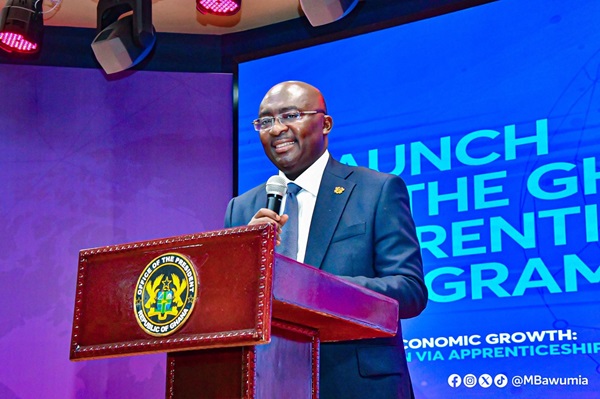Vice President Dr. Mahamudu Bawumia engaged with Ghanaian youth at the Borteyman Sports Complex in Accra on November 3, outlining his commitment to prioritizing youth development and welfare if elected president.
Dr. Bawumia underscored his commitment to empowering Ghanaian youth through three main pillars: education, skills training, and job creation.
He identified education as a vital catalyst for youth progress, pledging significant investment to expand access, especially at the tertiary level, building on the Free SHS programme’s success.
Dr. Bawumia emphasized that skills training would be closely integrated with education, with a strong focus on technical and vocational education (TVET).
To equip young people with essential skills for today’s economy, he committed to training 1 million youth in digital skills.
With these foundations in place, Dr. Bawumia detailed his plans to create millions of jobs across the country, addressing youth unemployment and fostering sustainable economic growth.
“Once you have an education and employable skills, the next step is to thrive in an economic environment that can generate a large pool of well-paying jobs, whether as an entrepreneur, self-employed, or an employee,” he said.
Here are the eight initiatives Dr. Bawumia outlined:
- Sustain Economic Growth for Business Expansion and Job Creation Dr. Bawumia underscored the need for a stable economic environment to foster business growth and job creation. His government would create a supportive environment for the private sector, which he called the “engine of growth,” and leverage private sector partnerships to reduce government spending on infrastructure projects.
- Expand Public Infrastructure With a focus on creating youth employment, Dr. Bawumia said his government would expand public infrastructure. For instance, he pledged to complete the Agenda 111 hospital projects, which he estimates would create around 72,000 jobs in the health sector.
- Support Businesses for Job Creation Dr. Bawumia proposed a “Buy Ghana First” policy to prioritise locally produced goods and services in public procurement. His government would also establish an SME Bank to meet financing needs of small and medium-sized businesses, which employ over 80% of Ghanaians. Additional incentives would include tax credits for start-ups and affordable power for industries through a restructured tariff system.
- Implement a Simplified Tax System Dr. Bawumia plans to implement a straightforward, business-friendly tax regime. This includes a flat tax rate for individuals and SMEs, as well as a predictable flat-rate duty on imports to stabilise prices. Port charges would be harmonised to match regional standards, particularly with Togo, making duties at Ghanaian ports equal or lower.
- Agricultural Sector Reform for Job Creation Dr. Bawumia expressed his ambition to achieve food security and job creation through modernised agriculture. He pledged to create agricultural enclaves in each region, invest in technology to reduce post-harvest losses, and establish district mechanisation centres. The Agricultural Development Bank (ADB) would also expand support for businesses involved in value-added agricultural products.
- Housing Sector Reform for Job Creation Dr. Bawumia’s housing policy would focus on public housing through partnerships with the private sector, similar to the Singapore model. This initiative, he stated, would provide millions of jobs across trades such as masonry, plumbing, and electrical work. He also proposed further development of the mortgage market by digitising the land registry and simplifying title establishment.
- Reform the Mining Sector for Job Creation In the mining sector, Dr. Bawumia committed to environmentally sustainable small-scale mining practices, with the goal of growing these operations into larger businesses. His government would provide support for training, financing, and capacity building to facilitate this transformation.
- Develop a World-Class Digital Economy The largest job initiative, Dr. Bawumia said, would be a digital skills training programme for 1 million young Ghanaians, preparing them for opportunities in Ghana and abroad. “I want to see Ghana build the digital talent we require for the Fourth Industrial Revolution,” he said. Additionally, his government would establish a Fintech Fund with a US$100 million seed capital to support Ghanaian start-ups developing exportable solutions.



